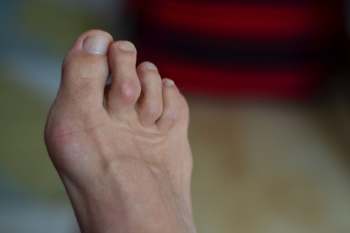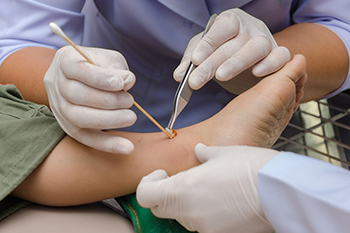
Foot pain can arise from a variety of conditions, including injuries, gout, warts, or bunions. Injuries like sprains, fractures, or strains can cause swelling, bruising, and difficulty walking. Gout, a type of arthritis, causes sudden, intense pain, often in the big toe, accompanied by redness and warmth. Warts, caused by a viral infection, appear as small, rough growths on the skin. Bunions are painful, bony bumps that form at the base of the big toe, often due to tight shoes or genetic factors. The causes of foot pain vary, from trauma and poor footwear to underlying health conditions like arthritis or infections. Treatments range from rest for injuries, medication for gout, to more specialized treatments like padding for warts or surgery for bunions. A podiatrist can provide an accurate diagnosis and effective treatments to relieve pain and prevent future issues. If you are experiencing foot pain, it is suggested that you make an appointment with a podiatrist.
Foot Pain
Foot pain can be extremely painful and debilitating. If you have a foot pain, consult with one of our podiatrists from Advanced Ankle & Foot Surgeons. Our doctors will assess your condition and provide you with quality foot and ankle treatment.
Causes
Foot pain is a very broad condition that could be caused by one or more ailments. The most common include:
Diagnosis
To figure out the cause of foot pain, podiatrists utilize several different methods. This can range from simple visual inspections and sensation tests to X-rays and MRI scans. Prior medical history, family medical history, and any recent physical traumatic events will all be taken into consideration for a proper diagnosis.
Treatment
Treatment depends upon the cause of the foot pain. Whether it is resting, staying off the foot, or having surgery; podiatrists have a number of treatment options available for foot pain.
If you have any questions, please feel free to contact our office located in O'Fallon, IL . We offer the newest diagnostic and treatment technologies for all your foot care needs.

Hammertoe is a common condition where one or more of the smaller toes bend at the middle joint, creating a curled or Z-shaped appearance. A hammertoe deformity often results from an imbalance in the tendons that control toe movement, which can develop due to genetic factors, injury, or pressure from other foot conditions like bunions. The second toe is most commonly affected, and symptoms include pain and difficulty wearing tight shoes. Corns on the top of the toe and calluses on the ball of the foot may form by extra pressure while walking. An X-ray may be taken to determine the severity of the hammertoe. Treatment options include taping or splinting the toe to reduce strain, as well as wearing orthotics that help redistribute pressure and improve foot alignment. A podiatrist can offer noninvasive measures as well as surgical solutions to relieve pain and restore proper foot function. If you have a painful hammertoe, it is suggested that you schedule an appointment with a podiatrist for treatment.
Hammertoe
Hammertoes can be a painful condition to live with. For more information, contact one of our podiatrists from Advanced Ankle & Foot Surgeons. Our doctors will answer any of your foot- and ankle-related questions.
Hammertoe is a foot deformity that affects the joints of the second, third, fourth, or fifth toes of your feet. It is a painful foot condition in which these toes curl and arch up, which can often lead to pain when wearing footwear.
Symptoms
Causes
Genetics – People who are genetically predisposed to hammertoe are often more susceptible
Arthritis – Because arthritis affects the joints in your toes, further deformities stemming from arthritis can occur
Trauma – Direct trauma to the toes could potentially lead to hammertoe
Ill-fitting shoes – Undue pressure on the front of the toes from ill-fitting shoes can potentially lead to the development of hammertoe
Treatment
Orthotics – Custom made inserts can be used to help relieve pressure placed on the toes and therefore relieve some of the pain associated with it
Medications – Oral medications such as anti-inflammatories or NSAIDs could be used to treat the pain and inflammation hammertoes causes. Injections of corticosteroids are also sometimes used
Surgery – In more severe cases where the hammertoes have become more rigid, foot surgery is a potential option
If you have any questions please contact our office located in O'Fallon, IL . We offer the newest diagnostic and treatment technologies for all your foot and ankle needs.

Diabetic foot ulcers are open sores or wounds that can develop on the feet of individuals with diabetes due to poor circulation and nerve damage. These ulcers can become chronic, slow to heal, and prone to infection if left untreated. An important treatment for managing diabetic foot ulcers is debridement, a process where dead or infected tissue is carefully removed from the wound. Debridement is essential because it stimulates healthy tissue growth, reduces the risk of infection, and promotes faster healing by allowing the body’s natural repair processes to function effectively. By removing dead tissue, debridement helps improve blood flow to the area, which is vital for recovery in diabetic patients with circulation issues. If you suffer from diabetic foot ulcers, it is suggested that you schedule appointments with a podiatrist for regular debridement, to prevent complications, avoid further tissue damage, and ultimately protect the foot from severe infection or amputation.
Wound care is an important part in dealing with diabetes. If you have diabetes and a foot wound or would like more information about wound care for diabetics, consult with one of our podiatrists from Advanced Ankle & Foot Surgeons. Our doctors will assess your condition and provide you with quality foot and ankle treatment.
What Is Wound Care?
Wound care is the practice of taking proper care of a wound. This can range from the smallest to the largest of wounds. While everyone can benefit from proper wound care, it is much more important for diabetics. Diabetics often suffer from poor blood circulation which causes wounds to heal much slower than they would in a non-diabetic.
What Is the Importance of Wound Care?
While it may not seem apparent with small ulcers on the foot, for diabetics, any size ulcer can become infected. Diabetics often also suffer from neuropathy, or nerve loss. This means they might not even feel when they have an ulcer on their foot. If the wound becomes severely infected, amputation may be necessary. Therefore, it is of the upmost importance to properly care for any and all foot wounds.
How to Care for Wounds
The best way to care for foot wounds is to prevent them. For diabetics, this means daily inspections of the feet for any signs of abnormalities or ulcers. It is also recommended to see a podiatrist several times a year for a foot inspection. If you do have an ulcer, run the wound under water to clear dirt from the wound; then apply antibiotic ointment to the wound and cover with a bandage. Bandages should be changed daily and keeping pressure off the wound is smart. It is advised to see a podiatrist, who can keep an eye on it.
If you have any questions, please feel free to contact our office located in O'Fallon, IL . We offer the newest diagnostic and treatment technologies for all your foot care needs.